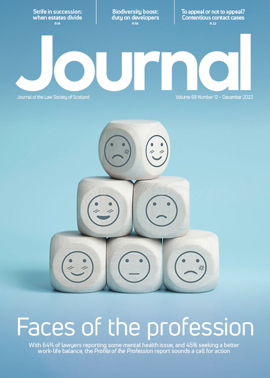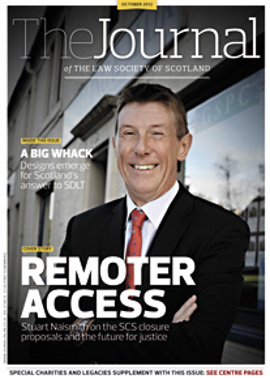Making sense of hearsay rules
Section 259 and common law
Does s 259 of the Criminal Procedure (Scotland) Act 1995, which sets out certain exceptions to the hearsay rule in criminal cases, supersede by implication the common law rules which would otherwise apply to those exceptions?
During the trial last year in HM Advocate v Malloy and Stewart [2012] HCJ 124 (report not published until 7 September 2012), an affirmative answer was given by a trial judge along with two colleagues consulted to hear argument on the point.
Two accused charged with murder had each incriminated the other. During cross-examination of the deceased’s sister, counsel for Malloy sought to lead evidence of hearsay statements made by the deceased to his sister prior to his death. Counsel for Stewart objected on the basis that no prior notice under s 259 had been given by Malloy, to be met with an argument that on a proper construction of s 262(4), the evidence was admissible at common law. That subsection provides that nothing in ss 259 to 261A shall “prejudice the admissibility of a statement made by a person otherwise than in the course of giving oral evidence in court which is admissible otherwise than by virtue of those sections”.
The court considered that both ss 259 and 262(4) were capable of more than one construction, and resolved the matter by applying three canons of statutory interpretation: the “mischief rule”; the principle that the law should be coherent and self-consistent; and the presumption against absurdity. A literal interpretation could not be sustained, having regard to the purpose of s 259, the inconsistency of allowing an optional approach to the admission of hearsay, and the absurdity of such an approach. Section 262(4) was designed to preserve the common law in relation to hearsay evidence of a kind not falling within ss 259 to 261A.
Vulnerable witness applications
The provisions in ss 271 to 271M of the 1995 Act have been regularly invoked in the Scottish criminal courts since first introduced in 2005. They have the purpose of ensuring that all vulnerable witnesses (not just children) may be spared the stresses and other negative experiences of giving evidence in the traditional way.
“Special measures” are encountered most frequently in sexual offence cases; such was the situation in AMI v Procurator Fiscal, Glasgow [2012] HCJAC 108 (7 September 2012). There, the accused was charged on complaint with sending naked images of his two 10-year-old daughters to two separate adult complainers by means of the internet, Facebook and other electronic methods, all contrary to s 127(1)(b) of the Communications Act 2003.
Both complainers were thought to be vulnerable, and the fiscal presented applications for the use of CCTV and the presence of a support person, in each case supported by a GP’s letter setting out the effects which the offence was thought to have had on them. The applications were considered in chambers by the sheriff without appearance (as he was entitled to do); both were granted. The accused presented a devolution minute, contending that he had been deprived of the opportunity of making representations against the granting of the applications, and suggesting that the adult complainers were not in fact vulnerable at all.
It was averred that such applications must be properly tested in an adversarial process before being granted, and in the present case there were risks in what had happened: there would be a “detrimental effect” on the way the accused’s case would be presented to the court and on the way the evidence of the witnesses, including the accused, was received by the court. Both sides sought a reference of the minute to the High Court so that the compatibility of the legislation with article 6 of the ECHR could be explored.
The sheriff refused to grant the devolution minute and his decision was upheld on appeal. The statutory provisions were held to be Convention-compliant; but if they were not, they could be “read down” so as to make them compliant. As for the process issue, it was open to an accused such as the appellant either to oppose the application prior to any grant in chambers or to seek a review of any such grant, and the court set out the procedures which might be followed in the case of objection. Finally, it was noteworthy that no specification had been given to the appeal court as to why the special measures granted would give rise to a significant risk of prejudice to the fairness of the hearing, or otherwise to the interests of justice.
Rejecting references
One of the less publicised, but equally important, by-products of the emergency response to Cadder was s 7 of the Criminal Procedure (Legal Assistance, Detention and Appeals) (Scotland) Act 2010, which amended the provisions of the 1995 Act relating to references to the High Court by the Scottish Criminal Cases Review Commission.
Not only was the Commission expressly required henceforth to have regard to the need for finality and certainty in the determination of criminal proceedings, when deciding whether it was in the interests of justice that a reference should be made: the High Court was also required to have regard to those matters once a reference had been made, at the later stage of determining whether it was in the interests of justice that any appeal arising from the reference should proceed. If having done so, the court determined that allowing such an appeal to proceed was not in the interests of justice, it had power to reject the reference: see ss 194C and 194DA.
But how should the court proceed when deciding whether or not to reject a reference? The answer is to be found in Reference by the Scottish Criminal Cases Review Commission in (1) RM and (2) Edward William Gallacher [2012] HCJAC 121 (decided on 25 April 2012 but not published until 11 September).
The two cases were referred by the Commission after its consideration of the extended statutory tests in the new provisions. In holding that in each case the identical tests to be applied by the court had been met and each reference should be allowed to proceed, the court observed that in the light of the “impressive record” of the Commission, it was unlikely that the court would have cause to differ from its judgment on such matters. A reference should only be rejected where the Commission had demonstrably failed in its task: for example, by failing to apply the statutory test at all; by ignoring relevant factors; by considering irrelevant factors; by giving inadequate reasons, or by making a decision that was perverse.
Finality of proceedings
Once more (and in a different context), the appeal court has found it necessary to draw attention to the need for finality in criminal proceedings. What about cases which drag on in the appeal court without reaching a final decision? This was the situation in Toal v HM Advocate [2012] HCJAC 123 (20 September 2012), where the court was faced with an appeal by a person convicted in July 2005 of a murder committed in 2004 and whose appeal had passed the sift in 2006.
What is significant about the opinions of the Lord Justice General and Lord Carloway (with whom Lord Kingarth agreed) is not that the grounds of appeal before the court were all dismissed, but that the court felt it necessary to deal in detail with the procedural history of the appeal process. This was because of the lodging on 30 January 2012 (on the eve of the appeal hearing) of a third set of additional proposed grounds of appeal, followed by a motion to continue the appeal so that the existing grounds might be amended and later argued. Notably, although the original grounds of appeal had passed the sift over five years previously, on two occasions thereafter the court had allowed additional grounds to be added. It also appeared that there had been at least one change of agency during the currency of the appeal; and over 30 procedural hearings had been fixed over a six year period before the final hearing took place. Many of those hearings had been discharged for various reasons and, in the procedural confusion, some of the new grounds of appeal were never subjected to the sifting process.
In refusing the motion to allow the further grounds to be argued, the Lord Justice General observed that in the space of seven years the appellant had been given three opportunities to state and argue his grounds of appeal. Now it was proposed to raise a point for which it seemed he had the relevant supporting material in 2008. No explanation was given as to why an appropriate ground of appeal was not tendered at that time. Finality of proceedings was not an irrelevance, and not a separate and subordinate consideration to the interests of justice but an aspect thereof; and where there was a challenge to a jury’s verdict it was in the interests of justice that it should be brought to a final decision within a reasonable time.
Agreeing with these sentiments, Lord Carloway observed that it should only be in exceptional circumstances, where cause is shown for the tendering of late grounds, that an appellant should be afforded an opportunity to present them. He described the indulgence afforded by the court to the appellant as “extreme”; it could not be allowed to recur.
In this issue
- Players and winners
- Access to client money?
- Tax and residential property
- Trusts and the family business
- Planning: the next level
- Reading for pleasure
- Opinion: Tom Mullen/Alan Paterson
- Council profile
- Book reviews
- President's column
- Deed plan criteria
- Decision time for justice
- "Can do": can you?
- Taxes heading north
- When the agent answers
- Taking care of child cases
- Collective redress
- Making sense of hearsay rules
- Don't forget the register
- Alcohol: the healthy option
- Seeding scheme is a draw
- Scottish Solicitors' Discipline Tribunal
- Human trafficking: is the system responding?
- Power points and positive rights
- A way to apply yourself
- Society presents "ambitious plans"
- Law reform roundup
- Business benefits
- On the right track
- Ask Ash
- Business radar
- Legacies: the untapped potential
- Charity begins at law
- Love them and leave to them
- Those difficult relatives






